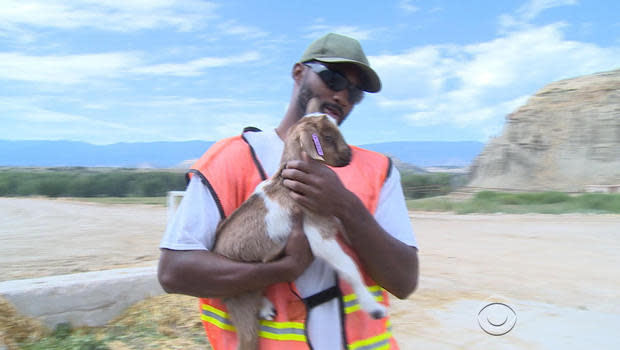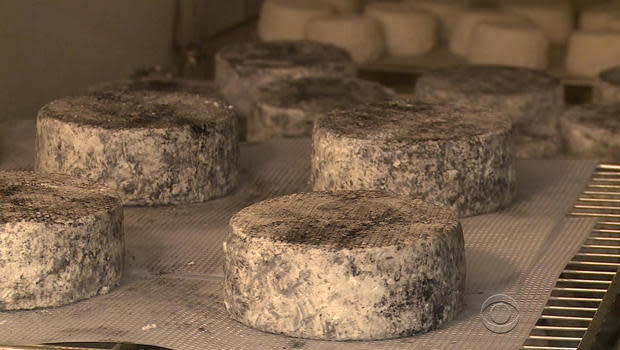Colorado puts prison inmates to work on farms
Across the country, states are desperately trying to make up budget shortfalls with a captive workforce: prisoners.
In Colorado, that means turning hard time into soft cheese.
About 100 miles south of Denver on a 6,000-acre farm, men are serving up some of Colorado's finest goat milk.
They're also serving time.

An inmate holds a kid at a goat farm in Colorado. CBS News
Tony Tate's sentence is eight years.
"Fifty-eight years old and on a goat farm," Tate said, laughing.
Tate used to be a flight attendant.
"I took an early retirement. And then I had too much time on my hands and I headed down the wrong path for a little bit with a drug."
He landed at Colorado Correctional Industries - a for-profit business run by the prison system. Director Steve Smith says the inmates he employs range from nonviolent offenders to more serious criminals.
"Our best workers tend to be the murderers -- because most of the time it's a crime of passion," said Smith. "It's a one-time deal. They've made a mistake and now they're trying to make up for it."
It's not just license plates they produce. Inmates make custom fishing rods, they tame Mustangs, even run a vineyard. The goat milk goes to dairies that produce artisanal cheeses, which along with their tilapia are sold at Whole Foods.

The goat milk is used to make artisanal cheese. CBS News
Colorado Correctional Industries generated $65 million in revenue last year ,with inmates earning anywhere from 66 cents a day to $600 a month. Without the program, Smith says, taxpayers would spend $5,000 more per inmate every year.
Columbia law professor Brett Dignam, a prisoners' rights advocate, is not familiar with this particular program, but questions whether work programs nationwide provide any real benefit to prisoners.
"I see exploitation," she said. "Most of the people populating our prisons are from concentrated urban environments where it's unlikely they'll be able to use those skills."

Prison inmates tend goats at a dairy farm. CBS News
Prison director Smith believes putting inmates to work makes sense.
"Ninety-seven percent of them are going to hit the streets. So would you rather them go out with the same tools they came in with? Or would you rather them come out with the tools we give them?"
For prisoner Tate, the payment is the process.
"To come out to a wide-open goat farm and not be locked up in a little cell room -- it's not something I take for granted."
He also gets satisfaction from knowing his cheese makes it to market.
Editor's note: An earlier version of this story implied that Columbia law professor Brett Dignam was speaking directly about the program in Colorado. Her comments were general in nature about prison work programs. The story has been updated to make that clarification.
$139M Florida home is most expensive listing in U.S.
Joan Rivers’ legacy of laughter
Family and celebrities say goodbye to Joan Rivers at funeral


